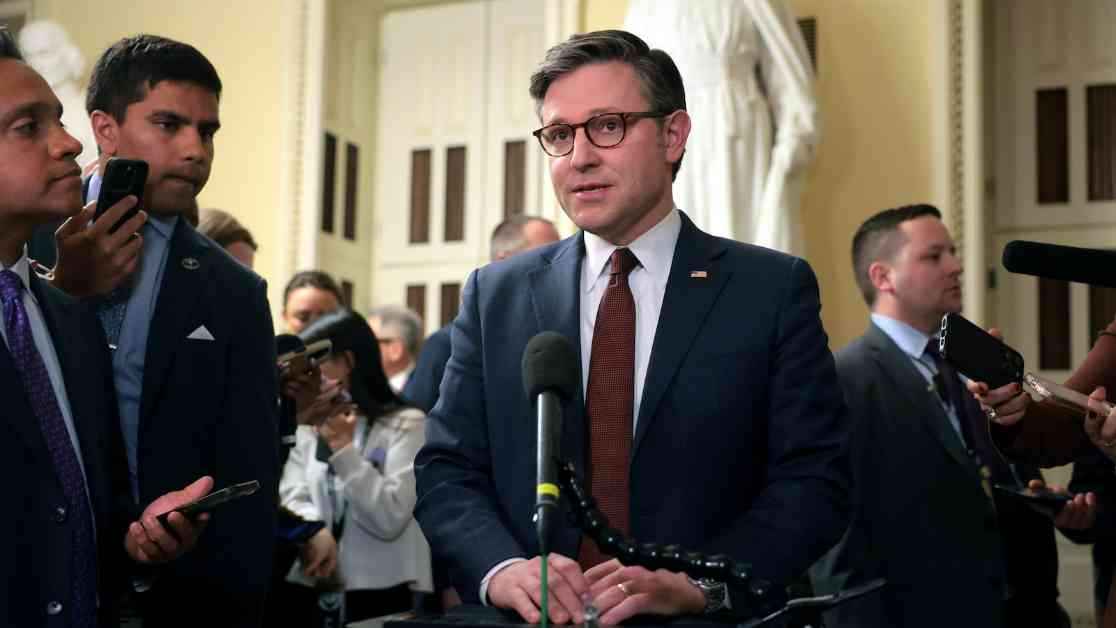House Republicans Secure Narrow Victory in Passing Budget Resolution to Fund Trump’s Agenda
In a nail-biting session filled with intrigue and political maneuvering, the House of Representatives achieved a significant milestone on Tuesday by approving the Republican budget resolution. The measure, aimed at kickstarting President Donald Trump’s legislative priorities, was passed by a slim margin of 217-215, underscoring the critical win for Speaker Mike Johnson and his leadership team.
The Uphill Battle of Securing Votes
The path to victory was not without its challenges, as GOP leaders faced the daunting task of flipping several holdout representatives to ensure the resolution’s passage. The pressure was on as Reps. Tim Burchett, Warren Davidson, and Victoria Spartz were successfully swayed to vote in favor, with only Rep. Thomas Massie standing as the sole Republican dissenting voice. The delicate balance of power meant that Republicans could afford to lose just one vote, heightening the suspense leading up to the final tally.
Following the contentious vote, Speaker Johnson expressed a mix of relief and determination, emphasizing the hard work that lay ahead. “A lot of work yet to be done, but we’re going to celebrate tonight, and we’ll roll up our sleeves and get right back at it in the morning,” Johnson remarked to reporters, capturing the grit and tenacity required in navigating the complex legislative landscape.
A Test of Political Strategy and Unity
The drama of the House session unfolded as GOP leaders scrambled to secure the necessary votes, even resorting to holding open the initial vote for over an hour to corral support. Democratic leaders seized the opportunity to rally their members, with Rep. Brittany Petterson and Rep. Kevin Mullin making poignant appearances to cast their votes, underscoring the high stakes and impassioned debate surrounding the budget resolution.
Despite the intense negotiations and last-minute maneuvers, Speaker Johnson remained steadfast in his commitment to delivering on Trump’s America First agenda. The strategic use of reconciliation, a procedural tactic requiring a simple majority for passage, underscored the meticulous planning and coordination essential in navigating the legislative process.
Challenges and Controversies on the Horizon
The road to enacting the budget resolution faced additional hurdles as Senate deliberations loomed large on the horizon. Senate Majority Leader John Thune’s divergent approach to the blueprint raised questions about the alignment of priorities between the two chambers. While Trump’s endorsement of the House Republican plan lent crucial support to the cause, lingering uncertainties remained about the Senate’s response and the ultimate fate of the budget resolution.
Amidst the political jockeying and ideological clashes, House Majority Leader Steve Scalise robustly defended the budget against Democratic criticisms, decrying accusations of Medicaid cuts as unfounded and misleading. The intricate dance of policy negotiations and competing interests underscored the high-stakes nature of budget deliberations and their far-reaching implications for essential programs like Social Security and Medicare.
As the dust settled on the House vote, the resounding message of unity and determination emerged from both parties. House Democrats, led by Minority Leader Hakeem Jeffries, stood united in their opposition to the Republican budget, framing the debate as a battle for the soul of American democracy. The impassioned rhetoric and stark contrasts in policy priorities highlighted the deep ideological fault lines shaping the budgetary landscape.
Looking ahead, the fate of the budget resolution hangs in the balance, with Senate deliberations poised to shape the next phase of the legislative process. The intricate interplay of political strategy, public opinion, and policy imperatives will continue to shape the unfolding drama on Capitol Hill, underscoring the enduring relevance and impact of budgetary decisions on the fabric of American society.


